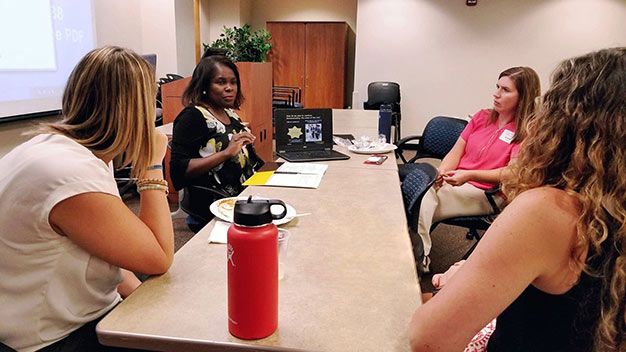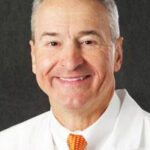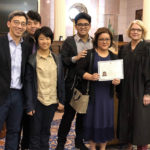
Lindell Joseph, a professor and director in the University of Iowa’s College of Nursing, talks with students in one of her classes. She is also a member of St. Patrick Parish in Iowa City and a lay Carmelite.
By Barb Arland-Fye
The Catholic Messenger
Lindell Joseph worked as a young nurse in St. Croix, U.S. Virgin Islands, when Hurricane Hugo struck in 1989. Single and living at home at the time, she remembered her father telling her that she needed to go to work. She told her father she wasn’t scheduled to work. He responded that as an essential worker, she would be needed at the hospital.
“It’s about having a sense of compassion. You’ve got to help other people,” said Joseph, who exercises another aspect of compassion as a professor and director of a program for nurses seeking advanced degrees in the University of Iowa’s College of Nursing.
The COVID-19 pandemic has turned people’s lives upside down, including the nurses she teaches online, said Joseph, a member of St. Patrick Parish in Iowa City. One nurse apologized for dropping classes for the time being as she deals with the crisis swirling around her.
Another nurse worried because her unit had begun admitting COVID-19 patients. Joseph has adjusted assignments and listened to her students’ concerns.
“These students reach out to me all the time,” she said. Providing emotional support is as important as academic enrichment.
Her capacity for compassion grew in the early 1990s while she cared for patients in Florida suffering from H.I.V. (human immunodeficiency virus) which can lead to AIDS (acquired immunodeficiency disease syndrome). Fear and stigma surrounded the virus. A lifelong Catholic, she said she prayed to God to help her through each shift.
Every time she entered an HIV patient’s room, she donned mask, glove, gown and other Personal Protective Equipment (PPE). “Some of the patients looked so alone, so skinny and so weak,” she recalled. “You felt so much empathy. You could see their suffering … you wanted to help them to feel human … you didn’t want them to see that you were scared.” Some of the patients died. “If they were going to die, you wanted them to die with dignity,” she said.
Joseph persevered and credits her Catholic faith and commitment to ongoing faith formation.
“There’s a need to be grounded in faith when you’re working in such a space,” said Joseph, now a lay Carmelite.
It takes all kinds of health care workers to provide good, compassionate healthcare, she said. People with specialized skills and people providing manual labor. We need innovators to reimagine health system operations and who can resolve today’s catastrophic health crisis, with the stealthy coronavirus.
Heroes in health care
The primary care providers, emergency medicine physicians, hospitalists, infectious disease specialists, and critical care specialists are at the forefront of this pandemic, said Dr. Tim Millea, an orthopedic spine surgeon and Iowa’s state director for the Catholic Medical Association. “They are doing all they can to accurately evaluate and appropriately treat patients with known or suspected COVID infection.
With each passing day, the diagnostic and treatment protocols become better clarified, but as we have all seen, this virus is an “invisible moving target.”
Protocols and policies are literally changing by the hour,” he said.
“Of course, none of this work would be possible without the nurses, technicians, technologists, housekeepers and administrators in the clinics and hospitals. They are truly the ‘hearts and hands’ that literally care for the patient. With the understandably strict and almost prohibitive visitor policies at the hospitals, they become the patient’s surrogate family member. They are putting themselves at risk every day, because they believe in the importance of their work. When we emerge from this, they deserve prominent recognition, added Dr. Millea, a founding member of the St. Thomas Aquinas Guild of the Quad Cities.
From a material standpoint, health care providers need PPE; from a logistics standpoint, they need understanding and cooperation. “Not everyone who has a cough or fever will be COVID-positive, and the majority of COVID-positive patients can be effectively and safely managed at home,” Dr. Millea said. “If symptoms develop, don’t head straight to your doctor or the emergency room. Call your doctor’s office, tell them about your symptoms, and they will be able to advise and triage you appropriately.”
Joseph said nurses appreciate hearing “Thank you.” They appreciate a helping hand. “Can you cook a meal to drop off at the house?” Joseph asked. Acknowledge nurses’ concerns about protecting their loved ones from contracting the coronavirus. She was called by a nurse manager to assist in asking other industries to donate atomizers to local hospitals. Atomizers may be needed to ensure that healthcare workers are fitted with the right size of N-95 masks.
Brian Dugan of LeClaire is a nurse and a deacon candidate. He said his wife, Karen, is considered at risk of becoming seriously ill if she were to contract the coronavirus. “I worried every day I went to work and came home,” he said. Now a co-worker at the industrial plant where he works is awaiting coronavirus test results. So Dugan is staying home and cannot return to work until possibly next week.
Support each other
Everyone should be taking proactive measures, he said. “Isolate, treat symptoms as they arise, wash hands ‘religiously,’ cover any cough/sneeze appropriately, do social distancing. And, when presenting for treatment, make the mentioned precautions even more pronounced as you approach care givers. Always think of those around you.”
The coronavirus affects him in another way, spiritually, “the fact that we cannot be together to worship. I am at my best in faith when I am practicing our Catholic faith together.”
Jennifer Hildebrand, parish nurse for Our Lady of the River Parish in LeClaire, is the mother of two nurses, one of whom is pregnant. “I’m worried about my daughters,” she admits. However, her daughters are well-versed in the protocols for avoiding and mitigating the spread of the virus and remain committed to their patients.
“Both of them see so many blessings in the midst of this —co-workers bending over backwards, young and single nurses taking extra hours and filling shifts so that young mothers who are nurses don’t have to come in.” Co-workers of her daughter Lisa, a nurse practitioner expecting her second child, make accommodations so that she doesn’t have to work in the off hours. “They’re pulling together and supporting one another,” Hildebrand said.
“The most powerful and important remedy we have as Christians is prayer,” Dr. Millea said. “Pray for the patients and their families. Pray for those caring for them. Pray for our pope, bishops, priests, deacons and religious as they do their best to shepherd us through uncharted territory that none of us have experienced before. And pray for each other, for your parish, community, state, country, and worldwide. This virus is not selective, it is opportunistic, and all races and faiths are potential victims. And, when you encounter those who work in health care, express your support, encouragement, and gratitude. It matters when you do.”











